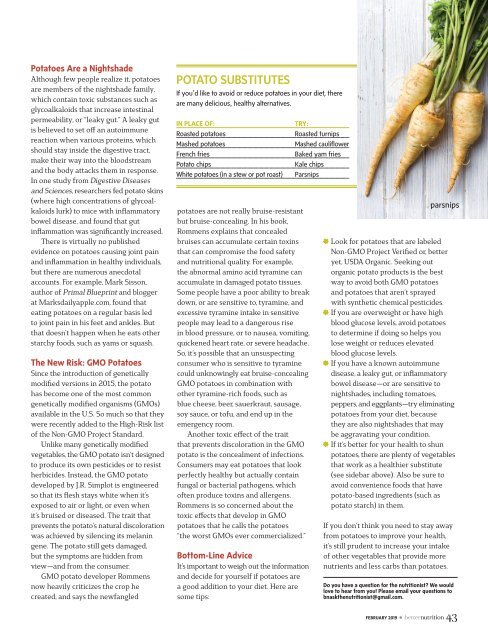Create successful ePaper yourself
Turn your PDF publications into a flip-book with our unique Google optimized e-Paper software.
Potatoes Are a Nightshade<br />
Although few people realize it, potatoes<br />
are members of the nightshade family,<br />
which contain toxic substances such as<br />
glycoalkaloids that increase intestinal<br />
permeability, or “leaky gut.” A leaky gut<br />
is believed to set off an autoimmune<br />
reaction when various proteins, which<br />
should stay inside the digestive tract,<br />
make their way into the bloodstream<br />
and the body attacks them in response.<br />
In one study from Digestive Diseases<br />
and Sciences, researchers fed potato skins<br />
(where high concentrations of glycoalkaloids<br />
lurk) to mice with inflammatory<br />
bowel disease, and found that gut<br />
inflammation was significantly increased.<br />
There is virtually no published<br />
evidence on potatoes causing joint pain<br />
and inflammation in healthy individuals,<br />
but there are numerous anecdotal<br />
accounts. For example, Mark Sisson,<br />
author of Primal Blueprint and blogger<br />
at Marksdailyapple.com, found that<br />
eating potatoes on a regular basis led<br />
to joint pain in his feet and ankles. But<br />
that doesn’t happen when he eats other<br />
starchy foods, such as yams or squash.<br />
The New Risk: GMO Potatoes<br />
Since the introduction of genetically<br />
modified versions in 2015, the potato<br />
has become one of the most common<br />
genetically modified organisms (GMOs)<br />
available in the U.S. So much so that they<br />
were recently added to the High-Risk list<br />
of the Non-GMO Project Standard.<br />
Unlike many genetically modified<br />
vegetables, the GMO potato isn’t designed<br />
to produce its own pesticides or to resist<br />
herbicides. Instead, the GMO potato<br />
developed by J.R. Simplot is engineered<br />
so that its flesh stays white when it’s<br />
exposed to air or light, or even when<br />
it’s bruised or diseased. The trait that<br />
prevents the potato’s natural discoloration<br />
was achieved by silencing its melanin<br />
gene. The potato still gets damaged,<br />
but the symptoms are hidden from<br />
view—and from the consumer.<br />
GMO potato developer Rommens<br />
now heavily criticizes the crop he<br />
created, and says the newfangled<br />
POTATO SUBSTITUTES<br />
If you’d like to avoid or reduce potatoes in your diet, there<br />
are many delicious, healthy alternatives.<br />
IN PLACE OF:<br />
Roasted potatoes<br />
Mashed potatoes<br />
French fries<br />
Potato chips<br />
White potatoes (in a stew or pot roast)<br />
potatoes are not really bruise-resistant<br />
but bruise-concealing. In his book,<br />
Rommens explains that concealed<br />
bruises can accumulate certain toxins<br />
that can compromise the food safety<br />
and nutritional quality. For example,<br />
the abnormal amino acid tyramine can<br />
accumulate in damaged potato tissues.<br />
Some people have a poor ability to break<br />
down, or are sensitive to, tyramine, and<br />
excessive tyramine intake in sensitive<br />
people may lead to a dangerous rise<br />
in blood pressure, or to nausea, vomiting,<br />
quickened heart rate, or severe headache.<br />
So, it’s possible that an unsuspecting<br />
consumer who is sensitive to tyramine<br />
could unknowingly eat bruise-concealing<br />
GMO potatoes in combination with<br />
other tyramine-rich foods, such as<br />
blue cheese, beer, sauerkraut, sausage,<br />
soy sauce, or tofu, and end up in the<br />
emergency room.<br />
Another toxic effect of the trait<br />
that prevents discoloration in the GMO<br />
potato is the concealment of infections.<br />
Consumers may eat potatoes that look<br />
perfectly healthy but actually contain<br />
fungal or bacterial pathogens, which<br />
often produce toxins and allergens.<br />
Rommens is so concerned about the<br />
toxic effects that develop in GMO<br />
potatoes that he calls the potatoes<br />
“the worst GMOs ever commercialized.”<br />
Bottom-Line Advice<br />
It’s important to weigh out the information<br />
and decide for yourself if potatoes are<br />
a good addition to your diet. Here are<br />
some tips:<br />
TRY:<br />
Roasted turnips<br />
Mashed cauliflower<br />
Baked yam fries<br />
Kale chips<br />
Parsnips<br />
*<br />
*<br />
*<br />
*<br />
parsnips<br />
Look for potatoes that are labeled<br />
Non-GMO Project Verified or, better<br />
yet, USDA Organic. Seeking out<br />
organic potato products is the best<br />
way to avoid both GMO potatoes<br />
and potatoes that aren’t sprayed<br />
with synthetic chemical pesticides.<br />
If you are overweight or have high<br />
blood glucose levels, avoid potatoes<br />
to determine if doing so helps you<br />
lose weight or reduces elevated<br />
blood glucose levels.<br />
If you have a known autoimmune<br />
disease, a leaky gut, or inflammatory<br />
bowel disease—or are sensitive to<br />
nightshades, including tomatoes,<br />
peppers, and eggplants—try eliminating<br />
potatoes from your diet, because<br />
they are also nightshades that may<br />
be aggravating your condition.<br />
If it’s better for your health to shun<br />
potatoes, there are plenty of vegetables<br />
that work as a healthier substitute<br />
(see sidebar above). Also be sure to<br />
avoid convenience foods that have<br />
potato-based ingredients (such as<br />
potato starch) in them.<br />
If you don’t think you need to stay away<br />
from potatoes to improve your health,<br />
it’s still prudent to increase your intake<br />
of other vegetables that provide more<br />
nutrients and less carbs than potatoes.<br />
Do you have a question for the nutritionist? We would<br />
love to hear from you! Please email your questions to<br />
bnaskthenutritionist@gmail.com.<br />
FEBRUARY <strong>2019</strong> • 43

















